How brazen offenders are using our highways to cause region-wide reigns of terror
Offenders across regional Queensland are becoming more brazen, violent and mobile, with quiet rural areas experiencing spikes in home invasions and car thefts. We investigate how these offenders are using our highways to cause terror.

Regional News
Don't miss out on the headlines from Regional News. Followed categories will be added to My News.
Highways are being used by criminals to bring waves of violent crime to areas formerly regarded as safe and quiet.
According to police across South West Queensland, offenders are using our state’s network of highways to travel long distances, bringing terror and crime with them.
In the blink of an eye they’re gone, often being able to hit two or three towns in a single night.
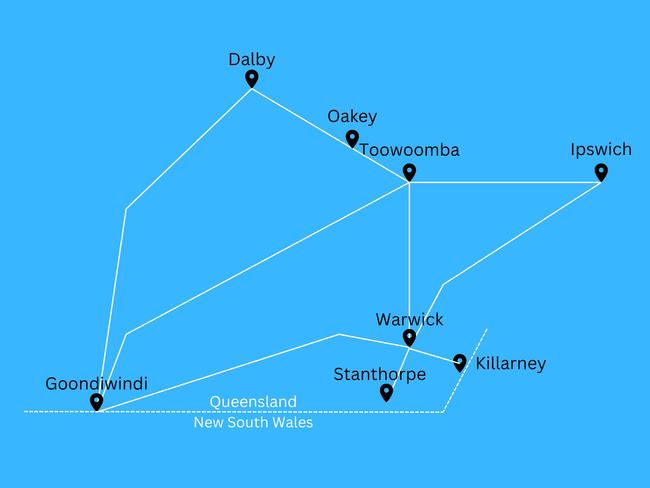
Recent spates of offending paint a terrifying picture. In Goondiwindi, offenders swarmed the town in the early hours across three days racking up almost 50 offences.
In Warwick, police will allege a carload of teenagers from Oakey travelled through Toowoomba and Goondiwindi before coming to an abrupt end when police caught up with them in the Rose City.
In Killarney at the border, a wave of terror came undone when an alleged offender was busted fleeing through a paddock after a spree through Allora, Karara and Warwick.
The very road network which is used to connect our communities is being used to commit offences which harm the innocent that reside in the towns they pass through.
EVOLVING CRIME
Goondiwindi Region mayor Lawrence Springborg AM knows his quaint town is located upon two major highways which can bring trouble.
Born in the region, he has never seen offenders become so brazen, sophisticated, and of most concern increasingly violent.
Usually coming from the south across the border, Mr Springborg says rates and scales of offending had increased over th past 18 months, reflecting statistics seen across regional Queensland as a whole.
He said offenders were becoming more “brazen”, hitting businesses like motels and pubs, giving Goondiwindi a bad name statewide.
“It’s a cohort of violent offenders for whom, crime pays, but in reality the community pays for the crime. These characters don’t have to pay the escalating insurance premium, or the differing value in insurance,” he said.

“If anyone actually says crime doesn’t pay, it actually pays because they lose nothing from it. Being caught by the police and spending a short time on remand is hardly an inconvenience for them.”
Mr Springborg blames a lack of harsh penalties for youth offenders, saying it causes the offenders to have disregard for themselves and escalates crime.
“The police need to be supported as there is a high clean up rate, but there needs to be a deterrence, which comes with consequence. You don’t steal 30 cars and burn them out and get more and more chances,” he said.

Mr Springborg has said the escalation of offending in his town had seen a significant impact on the community, particularly their “physical property and psychological” wellbeing, as well as the broader reputation.
“It doesn’t matter if you’re on the highway for lawful or unlawful matters, the highways help you move around,” he said.
“If you’re going from A to B and along the way there’s a border or regional town, it’s quite easy for them to do something on the way through, certainly in Goondiwindi or Warwick.
“Roads provide convenience for all sorts of purpose. Attacking people in their own home or place of accommodation as a traveller is much more brazen offending than previously seen.
“The offending is escalating from usually previous crimes of opportunity - like unlocked cars or homes - to breaking in and threatening occupants with weapons and being more violent. It has escalated across our areas as well as Queensland over the last 18 months.”
CONSEQUENCE OF CRIME
Almost 300,000 Queensland residents were victims of crime in the past 12 months as break-ins and car thefts soar.
Queensland Police Service data shows while offences like unlawful use of a motor vehicle spike in the summer months, trends over the past several years has shown the crime has increased to mammoth levels.
Offences across Queensland have also spiked to their highest levels since 2000, with more than 600,000 offences reported.
In comparison, NSW, home to 8.4 million people compared to Queensland’s 5.5 million, recorded just 11,673 vehicle thefts, while Victoria recorded 15,957.
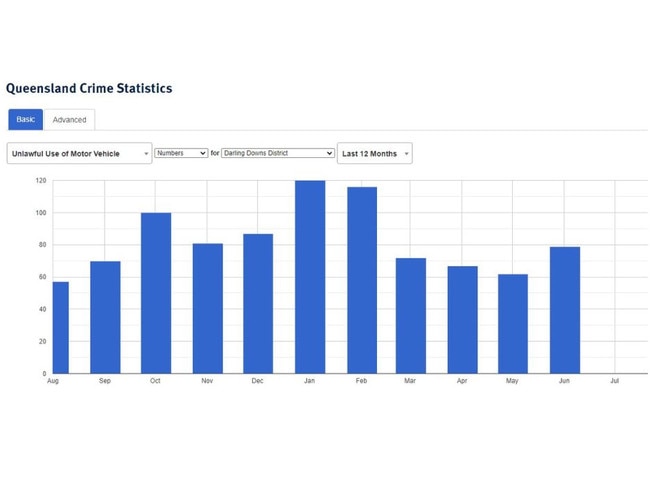
A Goondiwindi resident told News Corp in 2023 the town she was born and raised in was a fantastic place with lovely, welcoming people, but the attitudes had changed to “if not, but when” a resident would be targeted by thieves.
In June 2023, the back door of her home was bashed in while she was away, with the thieves fleeing with her friend’s car, while ramming her vehicle and carport.
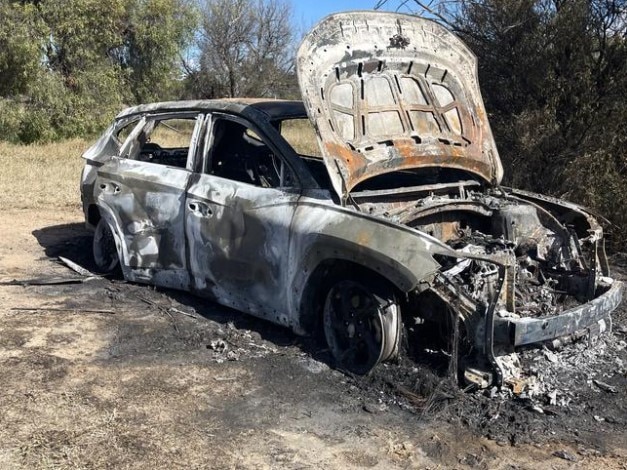
The stolen car was later located, burnt out on the outskirts of town.
“It’s all anyone can talk about, it’s come to a stage where everyone is wondering when it will happen to them, it’s a constant state of fear,” she said.
MORE MOBILE AND INFORMED
Country cops are aware that the nature of crime and offending throughout rural Queensland isn’t just changing, it’s evolving.
Older brass in law enforcement will tell you it comes in waves, and usually quiets down in the colder months, and after months of quiet no activity it explodes.
Acting Senior Sergeant Tim Hoffman has seen it all in his more than three decade career in rural policing.
Having been stationed at both Pittsworth and Inglewood, located along the Gore and Cunningham highways respectively, the top cop knows how those two towns see influxes of crime via the thoroughfares.
Now stationed at Warwick, the Sergeant Hoffman said that crime was more mobile and travels.
Sergeant Hoffman said these major arteries, often carving interstate, were used by criminals.
“In regional areas it can be tough being an officer, with a lack of resources and a heavy flow of traffic along the highways, we can be left to tackle a lot more ourselves,” Sergeant Hoffman said.
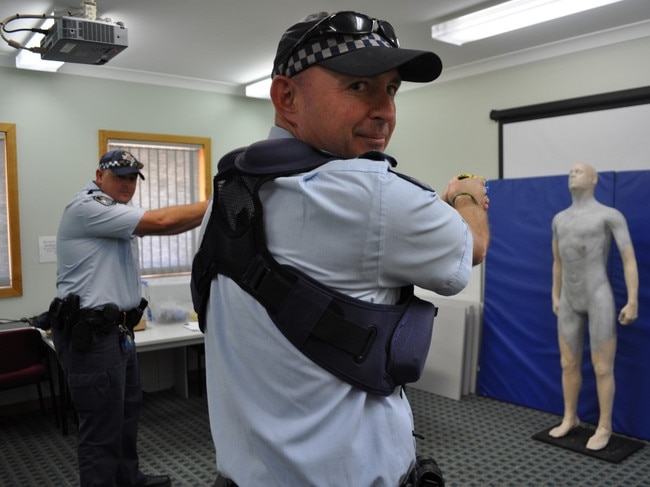
In the past decade, policing in regional areas along the major routes has also been more connected than ever, with access to intelligence, cameras and flying squads ready to lend a hand.
“We do find that the small communities in rural areas sees everything come through on those highways, offenders have got to get from A to B and will often stop in smaller towns, so if we can stop it in those towns, that’s a benefit and focus,” he said.
“The offenders are much more mobile than ever - they’re evolving - and they have more access to vehicles now whether stolen or otherwise and are more linked together through social media and technology.
“There’s a lot more technology than ten years ago, both the police and criminals are very interconnected and but we try and stay and front of it as much as possible.”
Sergeant Hoffman said the days where an offender stealing a car to get from A to B were gone. Instead cars will often be used to commit crimes and get away.
“We have them using those vehicles for the purpose of crime, whether trafficking drugs or property crime, they know those country areas are vulnerable and can easily get there,” he said.
“Police have much better mapping and resources to link criminals together, so we try to stay ahead of the game in that way.”
HOW POLICE RESPOND
Senior Sergeant Richard McIntosh, officer-in-charge at Goondiwindi, said crime had changed and his town had seen offenders coming from “a far scope” than previously.
Offenders will travel from Brisbane, to offend in places like Ipswich, Oakey and Toowoomba, before hitting “the end of the circuit” in Goondiwindi.
“We have previously had vehicles come up stolen from Sydney coming up and doing jobs in Goondiwindi,” Sergeant McIntosh said.
“Offenders are now coming from far and wide, as well as local offenders as well. They have the ability now (to be on the move and target multiple towns). If they get a car with a full tank of fuel they can travel out to the regions from Brisbane and back without a care in the world.”
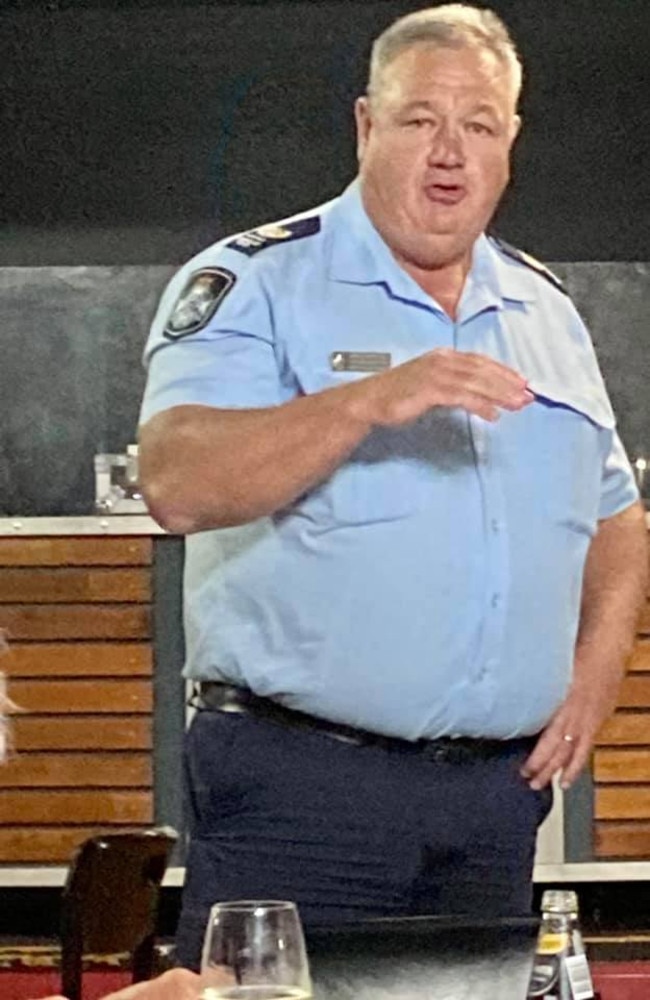
Sergeant McIntosh said places like Inglewood, a sleepy town on the Cunningham Highway of less than 1000 people, were seeing an increase of offences committed from people coming from outside the region.
Due to being located on a major “travel corridor” between Toowoomba and Moree, which would have a higher number of offenders at both ends, Goondiwindi has seen a history of this in the past. However, it’s “unusual” that offenders were travelling from so far out of the region and becoming increasingly violent and brazen.
“Violent crime has certainly increased here, before they would kick a door in and steal a keys, but we’re seeing more reports of threats with things like knives,” he said.
“This isn’t a new phenomenon for us out here, but I think it is getting more violent in the nature of offending.”
Sergeant McIntosh said police were responding to the rise of violent, mobile offenders by utilising the intelligence they have at their disposal.
“We have a lot of local intelligence out there and we inform the public to stay up today with what cars are being involved in crime series, and consistently urging the public to be prepared and secure their valuables,” he said.
While police at Goondiwindi have a high rate of solving offences, the mobility of offenders makes it a “bit harder to prevent them”.
Robbery, assault and unlawful use of a motor vehicle offences have soared in the past two years, particularly in 2023 in the Goondiwindi region.
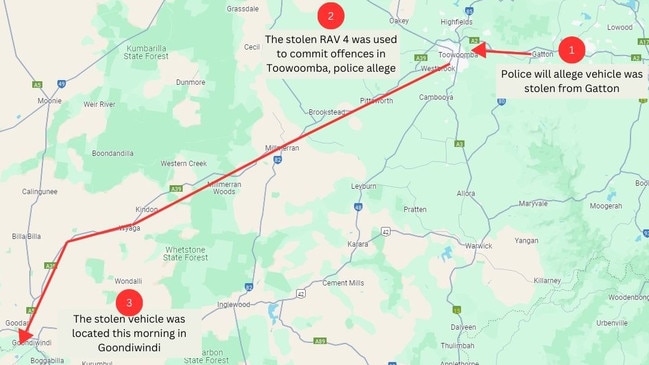
On Thursday, local police at Goondiwindi located a stolen vehicle, with police alleging the car was stolen in Gatton and used to commit offences in both Toowoomba and Goondiwindi during the night before being dumped.
While it may seem there is no wake in relation to the increase in violent offending, Queensland police were adamant that they were in front of the “evolving” offenders, one officer said.
However, time will tell if police tactics will put the brakes on the evolving highway offending.
More Coverage
Originally published as How brazen offenders are using our highways to cause region-wide reigns of terror




